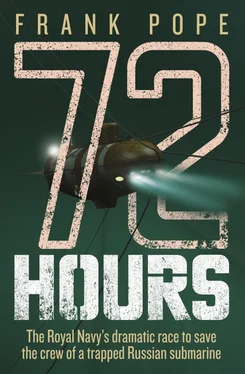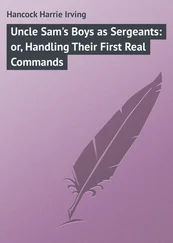Tuesday, 9 August
Morning
Kamchatka
As the crews returned from the ships, the MIGs that had previously loomed as ominous but silent Cold War silhouettes were now swarming with activity. A pilot sat in the open cockpit of one, apparently running pre-start checks. It took one of the RAF crew to point out the missing turbine blades and the grass growing up around the wheels.
Such theatrics were confusing – and a little amusing – to Squadron Leader Hewitt. During the long hours of waiting for news from the rescue team, he’d astonished one of the Russian Air Force officers on the base by inviting him on board the C17 to have a look around. The man had been wide eyed at seeing such cutting-edge foreign military technology – some of the latest that NATO aircraft had to offer – and at being given the chance to inspect it up close. Hewitt smiled and told him to take pictures if he liked, that there was nothing to hide. It wasn’t quite true; Hewitt had carefully placed a couple of newspaper supplements over the more sensitive bits of gear.
But the gesture of trust had evidently not diffused very far. Squadron Leader Hewitt and the other RAF pilots were having all sorts of hassle planning the return trip across Russia. While their outward trip had been blessed with humanitarian status by the Russians, Hewitt and the other pilots were now being forced to go through a tortuous series of hoops and to clear hurdles to gain the necessary diplomatic and flight clearances for the flight home.
The Russian Admiral who was in charge of the Elizovo airbase appeared at the aircraft as the pre-flight checks were finally being conducted. He was invited on board, where he made a presentation to the RAF crew of some vodka and salmon caviar.
Hewitt smiled. It was extraordinary to have been welcomed into a major military centre of a nation that had for so long been considered such a threat to British security and Western civilisation. There was a quiet satisfaction to knowing that he and his boys had played an integral part in freeing those Russian sailors from a frozen, suffocating underwater hell. The rescue would have been impossible without the RAF. It would have taken a long time to arrive on a boat, that’s for sure. His particular glow of fulfilment was known to all air transport crews, familiar as they are with supporting the glory boys in bombers or fighters. As the tanker pilots say, ‘Nobody kicks ass without tanker gas.’
Once the Admiral was off the plane and the pre-flight checks were finished, Hewitt called for clearance and the C17 started rolling towards the runway holding point. At 11.00 local time, Ascot 6564 lifted off, routing for Scotland, back across the frozen Russian north.
The sensations inside Stuart Gold could not have been more different from when they’d left Prestwick. The gnawing nervousness that had kept him shifting in his seat had been replaced by warm, comfortable satisfaction. It felt as though everything he’d ever done had been preparation for the events of those last 72 hours. His time on submersibles, his period as an electrical engineer, all of it felt as though it had played a part. When the incident had finally happened, it wasn’t anything like any of the scenarios they’d practised, but still they’d pulled it off. Fifteen years ago, he’d been a lowly computer repair man, underneath some teenager’s desk outside Edinburgh, when he’d decided that there must be more to life. Now he was, he realised, the person he’d always wanted to be. He found himself singing to himself with Midge Ure’s twang, his voice swelling as he hit the title line:
‘a good man in a storm’
Looking down the aircraft cargo bay, Riches observed that the team were all much better prepared for the return journey than they had been on the way out. They might not have the sleeping bags and DVD players that the RAF boys had, but at least this time they had found warm clothes and makeshift blindfolds to keep out the light and made earplugs to shut out the roar of those huge Rolls-Royce engines.
As the aircraft climbed to its cruising altitude, he could feel himself gaining perspective on everything that had happened. The incessant interviews he’d already done since the rescue had worn a deep groove in his brain about how things had gone: the brotherhood of the sea, the integrity and selflessness of international rescue, the bad luck that had led to the situation and so on. The truth was more complicated, but looking back on it he also felt a glow of fulfilment. Some of his worst fears had come true and problems he’d not even dreamed of had been thrown at the team, but they’d pulled it off. It wasn’t commanding a nuclear submarine, but he’d led an extraordinary mission on the far side of the world. His thwarted dreams of submarine command suddenly didn’t seem so bitter. Lots of submarine commanders had spent their careers training for battle with the Russian Navy, whereas he’d been involved in a much rarer thing: a genuine encounter between the two sides that had saved lives, not destroyed them.
Moscow and Petropavlovsk
When Captain Jonathan Holloway boarded his Aeroflot flight 24 hours later, he too felt a changed man. Twelve years earlier he’d jumped at the chance to serve on the Royal Yacht, but it had set him off down a path of Naval diplomacy that sometimes felt rather insubstantial. The last few days had proved otherwise.
All of the trust-building relationships, the exchange visits and the invitations to participate in exercises had paid off. The value of all that talk was minimal until it came to an actual incident, and the acid test of sincerity had now been passed. The value of international cooperation was now clear. If their efforts had failed, there was a risk the suspicious internal prejudices in Russia against working with foreigners would have been re inforced, and the UK’s relationship with Russia would doubtless have suffered as a result. But as things turned out, they could expect new levels of cooperation. The Defence Minister, Sergei Ivanov, was evidently personally grateful, and had given the team private gifts. With the crew of AS-28 walking in warm, fresh air once more, hopes of a new era of peaceful mutual collaboration soared.
‘These are moments worth living for,’ said the head of the Pacific Fleet, Admiral Fyodorov. ‘Today was a very happy event.’
The celebrations over the safe return of the submariners played out across the television channels in Russia and across the world. But the festivities cloaked an unwillingness to discuss the circumstances of the accident. When Ivanov decided to visit the hospital and meet the submersible’s crew, he invited along the sailors’ wives, Yelena Milachevskaya among them. Sitting in the hospital’s lounge, the minister had exchanged some pleasantries before asking the men to recount what had happened that day, 200 metres beneath the surface of Berezovya Bay. But when one of the men began to answer, Yelena was astonished to hear the group’s commander cut the sailor off abruptly and make it very clear that openness was not required.
The men promptly fell silent, and the Group Commander steered the subject towards less delicate, everyday matters. Gennady Vasil iyevich Bolonin, the engineer who as the only civilian on board could have disregarded the Group Commander’s order, had been transferred to a different hospital shortly before Ivanov’s visit. Afraid of getting her husband into trouble, Yelena bit her tongue, but was outraged by what she saw as a blatant direct cover-up by the military.
When the media were allowed to meet the sailors in their hospital ward, however, their stories had become strangely uniform. Contrary to what he’d said to his wife when he’d first seen her, Slava Milachevsky now told reporters that he’d never been worried or written a note, that he’d always known he was going to be rescued. The rest all repeated the same story – that they knew rescue was imminent, and that none of them had been concerned enough to write a farewell note to their loved ones.
Читать дальше












